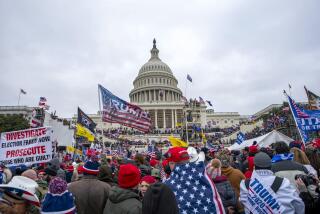Signs of Supreme Court activism worry Reagan administration lawyers
WASHINGTON — When the incoming Chief Justice John G. Roberts Jr. came before the Senate for confirmation seven years ago, President Reagan’s solicitor general gave him a warm endorsement as a “careful, modest” judge.
“He’s not a man on a mission,” Harvard Law professor Charles Fried testified, adding that Roberts was not likely “to embark on constitutional adventures.”
But two years ago, the Roberts-led Supreme Court struck down the federal and state laws that for a century had barred corporations and unions from pouring money into election campaigns.
And last week, the court’s conservatives, including Roberts, suggested they may well strike down President Obama’s healthcare law as unconstitutional. If so, it would be the first time since 1936 that the Supreme Court voided a major federal regulatory law.
After the healthcare arguments, Fried was among those who worried aloud about the prospect of the Roberts court embarking on a new era of judicial activism.
If the court were to invalidate the healthcare law, “It would be more problematic than Bush v. Gore,” Fried said in an interview, referring to the case that decided the 2000 presidential race. “It would be plainly at odds with precedent, and plainly in conflict with what several of the justices have said before.”
His comments highlight a growing divide between an earlier generation of judicial conservatives who stressed a small role for the courts in deciding national controversies and many of today’s conservative justices who are more inclined to rein in the government.
At the heart of last week’s argument over the healthcare law was a dispute over power. Does Congress or the Supreme Court define the limits of economic regulation?
The Obama administration’s lawyers, relying on 20th century precedents, said Congress has broad authority to “regulate commerce” in national markets, including health insurance. Regardless of whether the healthcare law’s requirement that everyone have insurance is a smart or good regulation, Solicitor Gen. Donald B. Verrilli Jr. said the “Constitution leaves [this] to the judgment of Congress and the democratically accountable branches of government.”
The court’s leading conservatives objected and spoke of their duty to enforce limits set by the Constitution. If the government can force people to enter the market and buy insurance, Justice Antonin Scalia asked, “what’s left?”
“The federal government is not supposed to be a government that has all powers,” he said.
Are “there any limits” on Congress if this stands? asked Justice Anthony M. Kennedy. Roberts said “all bets are off” if the government can regulate an industry by forcing people to buy a private product.
Fried had confidently predicted the law would be easily upheld. He said he was taken aback by the tone of the arguments. “The vehemence they displayed was totally inappropriate. They seemed to adopt the tea party slogans,” he said.
Pepperdine law professor Douglas W. Kmiec, another top Justice Department lawyer under Reagan, said he hoped the justices would “come to their senses” and uphold the law as a reasonable regulation of interstate commerce.
Among younger conservatives, Fried and Kmiec have their detractors because they endorsed Obama during the 2008 campaign. But they are not alone among Reagan-era lawyers who continue to emphasize judicial restraint.
In November, Judge Laurence H. Silberman, a Reagan appointee to the U.S. Court of Appeals in Washington and long a leader of the conservative legal movement, wrote an opinion upholding the healthcare law on the grounds that Congress has the power “to forge national solutions to national problems.”
The Reagan-era lawyers sought to rein in what they saw as liberal judicial activism. For example, Fried and Kmiec thought the Roe vs. Wade ruling that struck down the state abortion laws was a mistake and should be overturned. However, they thought the high court should stand back and defer to Congress on matters of business and economic regulation.
But Congress is not held in very high regard by most of the justices. In public and private comments, they often speak with disdain of the politicians in the House and Senate.
Scalia mentioned the so-called Cornhusker Kickback during the healthcare arguments as an example of the kind of unsavory deal that goes into passing a law. The “kickback” — a boost in federal Medicaid funding for Nebraska — was intended to secure the vote of Ben Nelson, the state’s Democratic senator, for the healthcare law. The controversial provision was quickly scrapped.
The justices’ view of Congress was not improved two years ago when Obama lambasted the court’s decision in Citizens United, the campaign funding case, during his State of the Union address. As he spoke, the Democrats rose to their feet and cheered and jeered as Roberts and the other justices sat silently.
Despite the oral arguments, many legal experts on the left and right say they doubt the high court will strike down the healthcare law by a 5-4 vote.
Fried said he is no longer sure. “The odds of [striking it down] have gone way up,” he said.
Fried testified at Justice Samuel A. Alito Jr.’s confirmation hearing as well as the one for Roberts. “My judgment was that they were committed to the rule of law and to precedent,” he said, pausing. “I hope that turns out to be true.”
More to Read
Get the L.A. Times Politics newsletter
Deeply reported insights into legislation, politics and policy from Sacramento, Washington and beyond. In your inbox three times per week.
You may occasionally receive promotional content from the Los Angeles Times.











